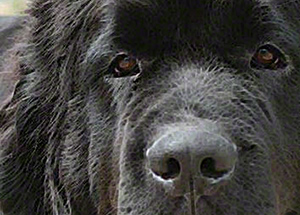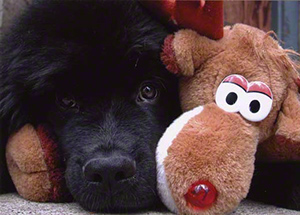The arrival of a new puppy is an exciting event, and the inevitable change in household routine will go much smoother if you’re well-prepared for the arrival of your Newfoundland newcomer. The following items and discussions should help you to get ready – or, if your puppy is already at home, to make sure you’ve covered all the bases. (If you’re not new to dog ownership, some of what’s discussed below will be familiar, but please read through the list anyway, as many of its suggestions are Newf specific. Newfoundlands’ size and breed characteristics mea n that what works for a Lab or a boxer won’t necessarily fill the bill now, or at least not when your new member of the family is full-grown.)
ACTIVITIES
One of the first things new puppy owners should be doing is thinking about and searching for the best opportunities to train and socialize their puppy. Even very experienced dog owners and competitors take their dogs to classes for the socialization experience, and given that the “socialization window” for dogs closes by the time they’re about 16 weeks old, advanced planning will help you make the most of your opportunities.
Training for your Newf is essential, so look into training classes. Ask your breeder, if she’s local, or your vet, or dog-owning friends and neighbors. Local canine centers and training clubs (find these over the internet by searching for “kennel club” or “dog training” in your area) also usually have classes or other opportunities for you to have fun with your Newf in company with other puppies and to begin learning about training and obedience. Even the “big-box” pet stores offer puppy and other training classes, so there’s no excuse for an untrained puppy.
One excellent opportunity to begin your dog ’s training while providing a fun and enriching experience is provided by the AKC’s S.T.A.R. Puppy program, which teaches basic communication with your dog, socialization, and important commands. The AKC’s Canine Good Citizen (CGC) program is the next step, and provides a great way for you to interact with your dog while getting her ready for venturing out into the big wide world.
Of course, play dates with other dog-owning neighbors and local dog parks provide other opportunities for getting your dog accustomed to other dogs – and people – while burning off energy and getting essential exercise. Local dog events such as parades, festivals, and fun walks are another way to get your dog familiar with the world. Be sure to talk with your vet before engaging in such activities, however. Dog parks are not suitable for puppies still undergoing vaccination protocols and whose bones are still growing, and long parades are too much for a young giant-breed dog. Make informed decisions for both your peace of mind and the health of your dog.
Above all, don’t forget your regional Newfoundland club. Most parts of the United States are covered by one of the regional Newfoundland clubs, which provide a great source of knowledge and camaraderie. You don’t have to be interested in competing with your Newf to join a regional club, or to join the parent club, the Newfoundland Club of America; these organizations are open to anyone with an interest in Newfs, and provide a great way to meet fellow Newf owners and to socialize – both yourself and your puppy – with people who understand life with these big, slobbery, wonderful dogs. Check out the Regional Club map on the Newfoundland Club of America website for more information.

